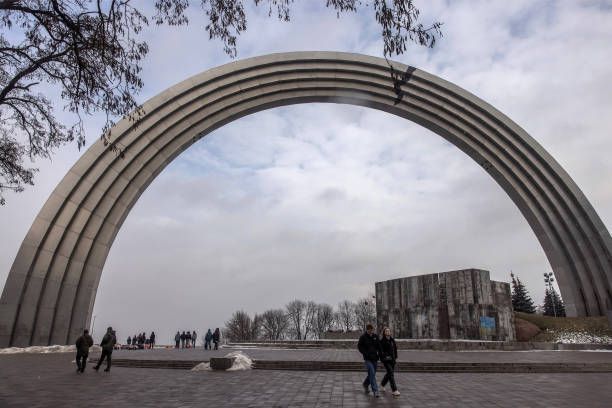Ukraine’s Ministry of Culture has taken a significant step in removing the formerly-named Peoples’ Friendship Arch from the state register of monuments of national importance due to its association with Russia’s ambitions for Soviet reunification. The decision to potentially dismantle the monument comes as a response to the myth of ‘reunification’ of the two ‘fraternal’ peoples, which does not align with historical realities and is actively used to justify Russian President Vladimir Putin’s territorial claims. The monument, erected in 1982 to commemorate the formation of the Soviet Union and the October Revolution of 1917, was renamed The Arch of Freedom of the Ukrainian People by Kyiv City Council in May 2022 following Russia’s invasion of Ukraine. A bronze Soviet-era statue symbolizing the friendship between Russia and Ukraine was also dismantled in April 2022.
Kyiv City Council has contemplated the idea of dismantling the arch, but due to its protected status, the removal of the monument has not been officially decided. Despite the renaming to the Arch of Freedom of the Ukrainian People, the monument still embodies Soviet ideological themes and connotations, posing a threat to Ukraine’s national security. The Ukrainian parliament initiated the decommunization process in 2015 by outlawing most Soviet and communist symbols, street names, and monuments. The removal or alteration of Soviet-era monuments has been ongoing throughout the country, although the abundance of such statues has prolonged the completion of the decommunization project. President Volodymyr Zelensky signed a law in April 2023 that prohibits naming geographic sites in Ukraine after Russian figures or historical events associated with Russian aggression.
The decision to remove the Peoples’ Friendship Arch reflects Ukraine’s commitment to distancing itself from Soviet-era symbols and ideologies that are seen as threats to national security. The monument’s association with Russia’s ambitions for Soviet reunification and the myth of ‘reunification’ of fraternal peoples have been deemed historically inaccurate and detrimental to Ukraine’s sovereignty. By dismantling the arch and renaming it to reflect the freedom of the Ukrainian people, Kyiv City Council aims to redefine the narrative and symbols that represent Ukraine’s national identity. The continued effort to remove Soviet-era symbols and monuments is part of a broader initiative to commemorate Ukraine’s history and assert its independence from Russian influence.
The removal of the Peoples’ Friendship Arch and the ongoing decommunization process in Ukraine signify a larger shift towards reclaiming national identity and historical narratives. The outlawing of Soviet and communist symbols, street names, and monuments has been a crucial step in challenging the lingering presence of Russia’s historical influence in Ukraine. By enacting laws to prevent the naming of geographic sites after Russian figures or events associated with aggression, President Zelensky and the Ukrainian government are actively working to shape a narrative that emphasizes Ukrainian sovereignty and independence. The dismantling of the arch and the removal of Soviet-era symbols symbolize a defiant stance against external influence and a reaffirmation of Ukrainian identity.
Despite the progress made in removing Soviet-era symbols and monuments, challenges remain in completing the decommunization process due to the sheer number of statues and symbols present throughout the country. The decision to potentially dismantle the Peoples’ Friendship Arch highlights the complexity of Ukraine’s efforts to redefine its national identity and history. As the country continues to confront its past and assert its independence, the removal of Soviet-era monuments serves as a pivotal step in shaping a narrative that reflects Ukraine’s sovereignty and distinct cultural heritage. Join us in supporting independent journalism in Ukraine as we strive to uphold the values of freedom and democracy in the face of challenges to national identity and historical narratives.


